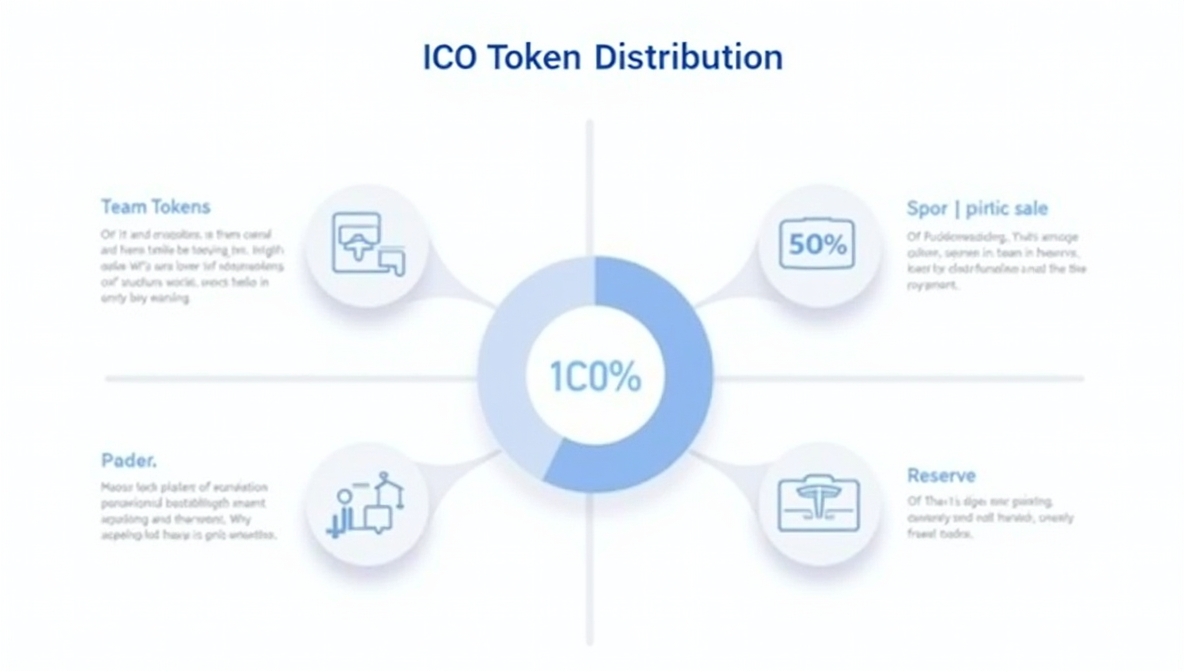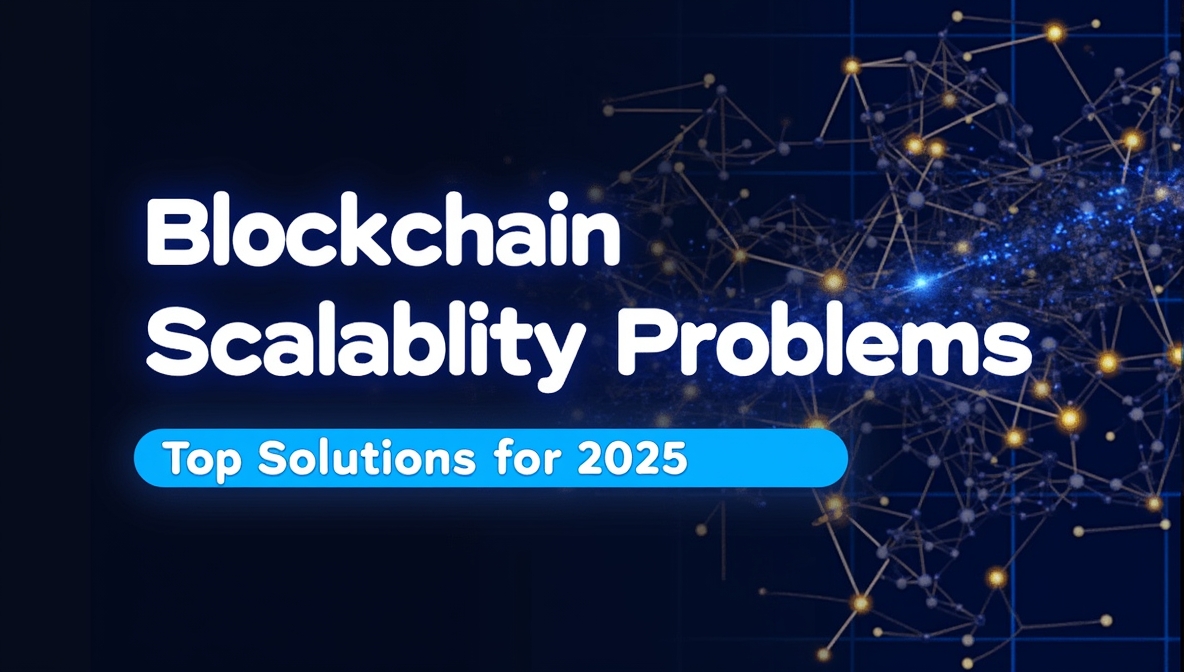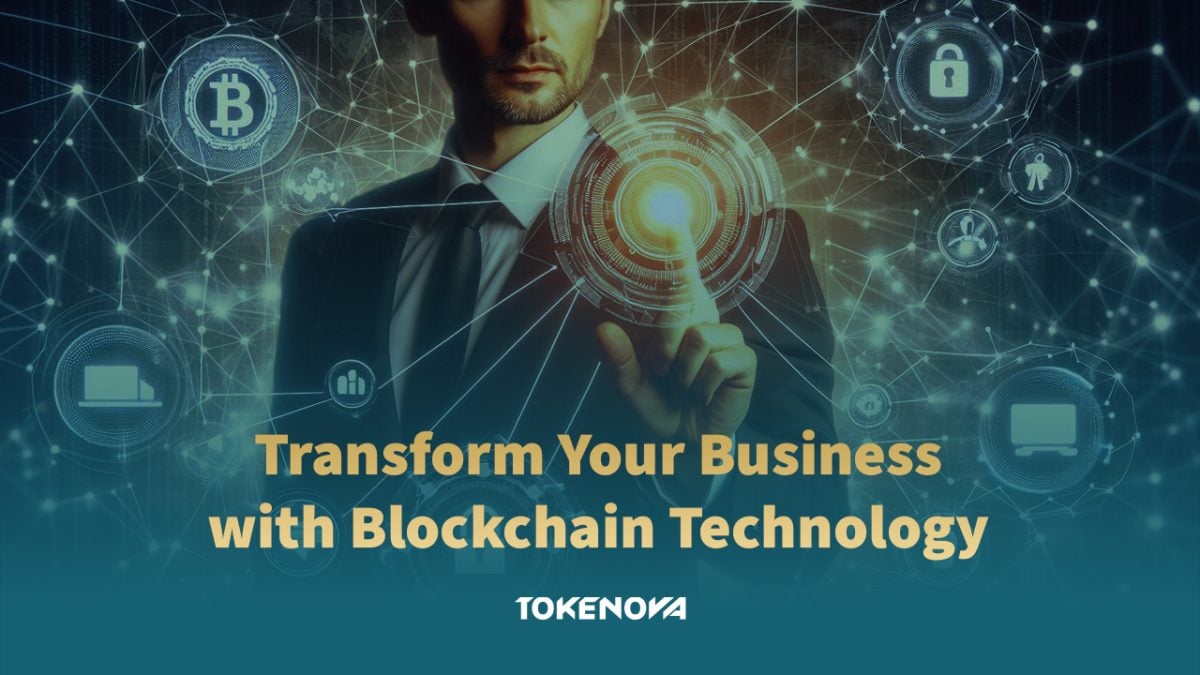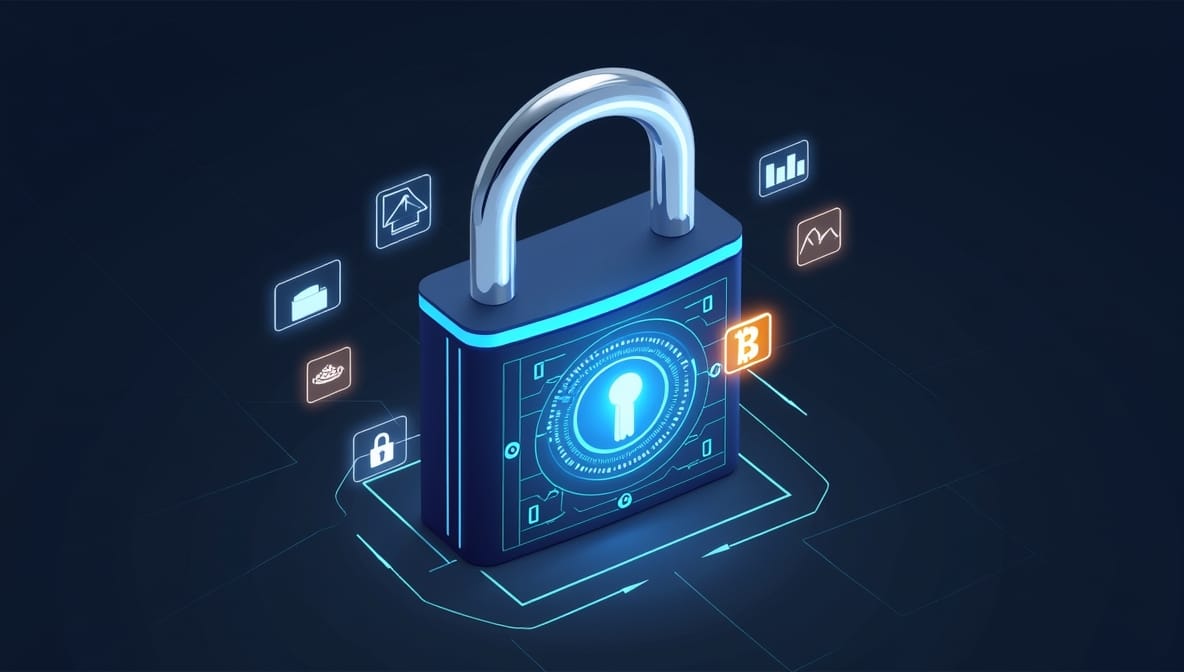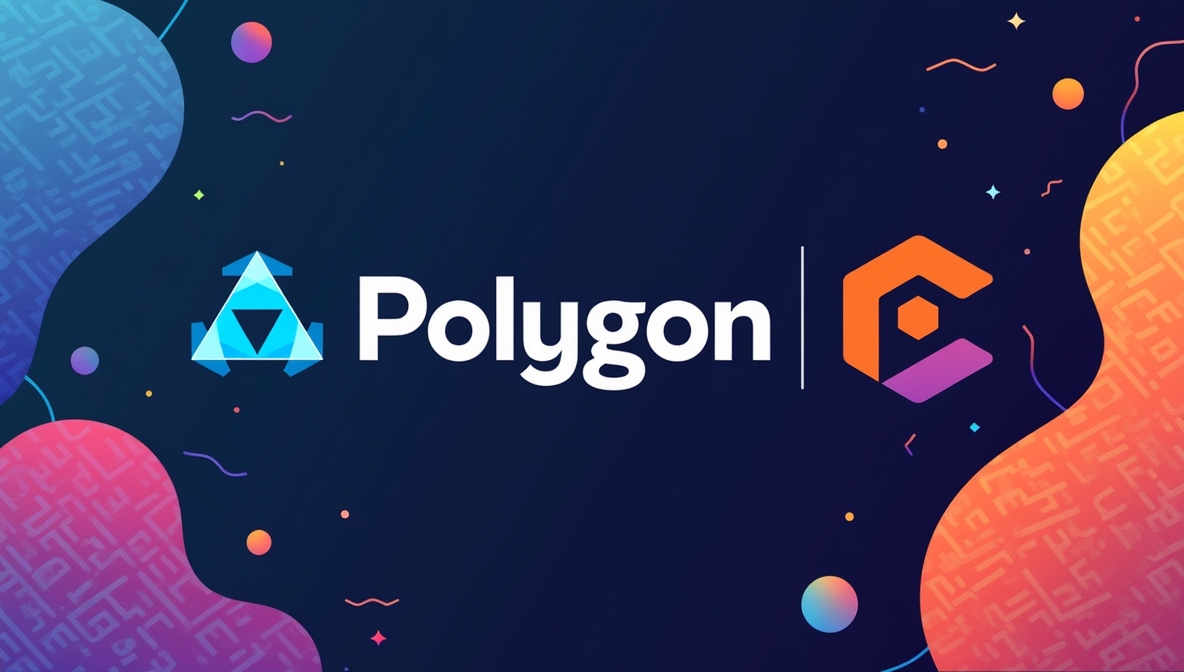Imagine a world where owning and leasing high-value assets is as easy as trading stocks online. Welcome to the era of Asset Tokenization and Leasing, a groundbreaking fusion that leverages blockchain technology to transform traditional financial models. Asset tokenization involves converting ownership rights of physical or digital assets into digital tokens, making transactions more secure, transparent, and accessible. On the other hand, leasing has long been a staple in finance, allowing individuals and businesses to utilize assets without the hefty upfront costs. However, traditional leasing comes with its own set of limitations, such as inflexibility, high transaction costs, and restricted accessibility.
The convergence of asset tokenization and leasing presents an innovative model that overcomes these challenges. By integrating blockchain technology, tokenized leasing solutions offer enhanced security, fractional ownership, and increased liquidity, revolutionizing how assets are managed and utilized. This comprehensive article delves deep into the world of Asset Tokenization and Leasing, exploring its fundamentals, benefits, challenges, and future prospects. Whether you’re an investor, business owner, or simply curious about the future of finance, this guide provides valuable insights into how blockchain is reshaping asset management and leasing.
What is Asset Tokenization?
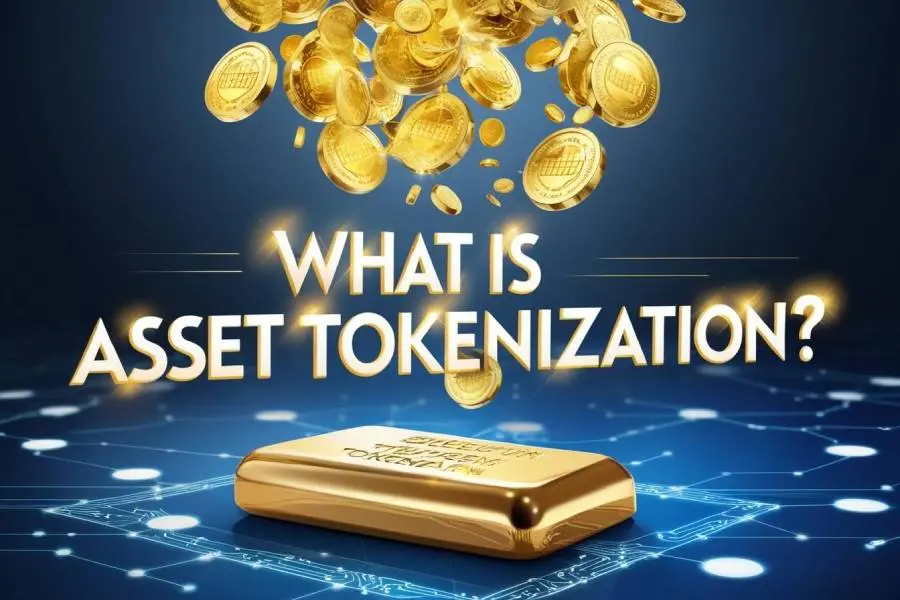
A New Era for Ownership and Leasing
Asset tokenization is the process of converting ownership rights of physical or digital assets into digital tokens on a blockchain. This innovative approach allows assets to be divided into smaller, more manageable units, enabling fractional ownership and making high-value investments accessible to a broader audience. From real estate and fine art to machinery and vehicles, nearly any asset can be tokenized, unlocking new avenues for investment and leasing.
How Asset Tokenization Works:
- Digital Representation: Ownership rights of an asset are encoded into digital tokens using smart contracts. Each token represents a specific fraction of the asset.
- Blockchain Ledger: These tokens are recorded on a decentralized, immutable blockchain ledger, ensuring transparency, security, and traceability.
- Asset Categories: A wide range of assets can be tokenized, including tangible assets like real estate, vehicles, and equipment, as well as intangible assets like intellectual property and digital art.
Blockchain technology ensures that each token is securely tracked and managed, providing a trustworthy foundation for leasing and trading assets.
Read More: Tokenization and OTC Market: Revolutionizing Asset Trading
Importance of Asset Tokenization
Asset tokenization democratizes access to investment opportunities by lowering the barriers to entry. Investors can purchase fractional tokens of high-value assets, diversifying their portfolios without the need for significant capital outlay. For asset owners, tokenization offers enhanced liquidity, as tokens can be easily traded on blockchain marketplaces, reaching a global pool of investors.
Moreover, tokenization streamlines the management of assets by automating processes through smart contracts. This reduces the need for intermediaries, lowers transaction costs, and accelerates settlement times, making leasing and trading more efficient and cost-effective.
The Basics of Leasing and Its Evolution Through Tokenization
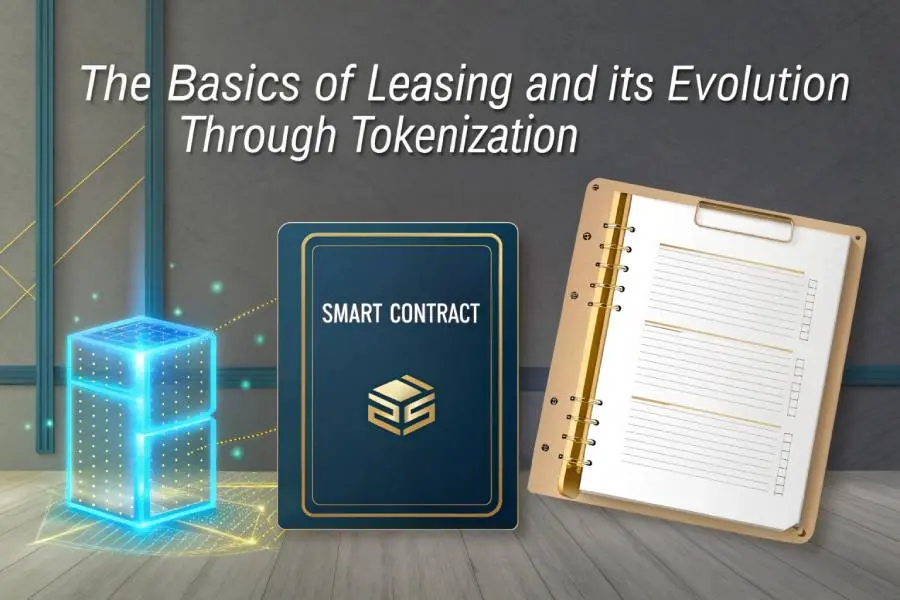
Traditional Leasing: The Old Roadblocks
Leasing has been a fundamental financial tool for individuals and businesses, allowing them to use assets without owning them outright. Common leasing models include:
- Operating Lease: Short-term leases where the lessor retains ownership of the asset, often used for equipment and vehicles.
- Finance Lease: Long-term leases that transfer ownership rights to the lessee by the end of the lease term, commonly used for real estate and heavy machinery.
However, traditional leasing faces several challenges:
- Inflexibility: Rigid lease terms that may not adapt to changing needs or market conditions.
- High Costs: Significant expenses related to intermediaries, administration, and transaction processing.
- Limited Access: High-value leases are typically accessible only to institutional investors or large corporations, excluding smaller investors.
Tokenized Leasing: A Modern Solution
Tokenized Asset Leasing Explained revolutionizes traditional leasing by addressing its inherent limitations through blockchain technology. Here’s how:
- Automation: Smart contracts automate lease agreements, including terms, payments, and compliance, reducing the need for manual intervention.
- Fractional Leasing: Assets are divided into digital tokens, allowing multiple lessees to own and lease portions of the same asset, enhancing flexibility and accessibility.
- Increased Liquidity: Token holders can trade their ownership shares on blockchain marketplaces, providing liquidity and enabling investors to enter and exit positions with ease.
Tokenized leasing introduces a flexible, cost-effective, and inclusive model that benefits both asset owners and lessees, paving the way for a more dynamic financial ecosystem.
Advantages Over Traditional Leasing
- Flexibility: Smart contracts allow for customizable lease terms that can adapt to specific needs and market changes.
- Cost Efficiency: Automation reduces the need for intermediaries, lowering transaction and administrative costs.
- Accessibility: Fractional ownership lowers the capital barrier, making high-value assets accessible to a wider range of investors.
- Global Reach: Blockchain technology facilitates cross-border transactions, expanding the pool of potential lessees and investors.
By overcoming traditional leasing obstacles, tokenized leasing offers a more efficient and inclusive alternative that meets the demands of the modern financial landscape.
Read More: Asset Tokenization Process: Transforming Finance for the Future
How Does Tokenized Leasing Work?
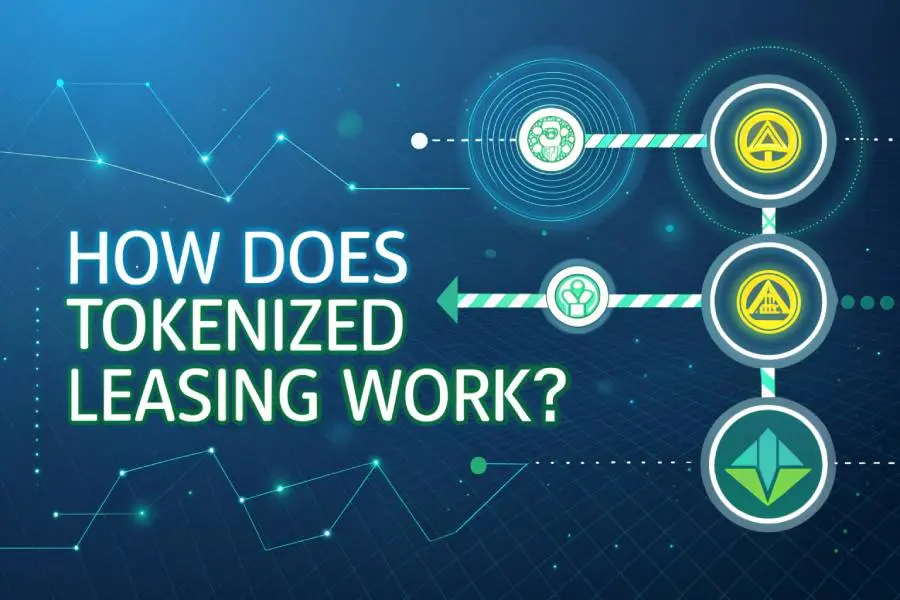
Step-by-Step Guide
Digital Asset Leasing Solutions on Blockchain involve a streamlined process that leverages blockchain’s capabilities to enhance leasing operations. Here’s a detailed look at how tokenized leasing works:
- Asset Identification:
- Select an asset suitable for tokenization, such as real estate, vehicles, machinery, or luxury goods.
- Assess the asset’s value, market demand, and potential for fractional ownership.
- Token Creation:
- Divide the asset’s ownership into digital tokens using smart contracts.
- Each token represents a specific share of the asset, enabling fractional ownership.
- Lease Execution:
- Define lease terms within the smart contract, including duration, payment schedules, and conditions.
- Smart contracts automatically enforce lease agreements, ensuring compliance and timely payments.
- Blockchain Integration:
- Record all transactions on the blockchain, providing a transparent and immutable ledger.
- Enable real-time tracking of ownership, lease terms, and payment histories.
- Marketplace Listing:
- List the tokenized asset on blockchain-based leasing platforms or marketplaces.
- Allow investors and lessees to buy, sell, or lease tokens as per their requirements.
This seamless integration of asset tokenization and leasing on blockchain ensures efficiency, transparency, and security throughout the leasing lifecycle.
Key Stakeholders Involved
- Asset Owners: Individuals or entities that own the asset and wish to lease it out through tokenization.
- Lessors: Parties who provide the asset for lease, earning income from lease payments.
- Lessees: Individuals or businesses that lease the asset, benefiting from its use without full ownership.
- Investors: Individuals who purchase tokens, gaining fractional ownership and earning returns from leasing activities.
Each stakeholder plays a vital role in the tokenized leasing ecosystem, contributing to a dynamic and collaborative financial environment.
Role of Smart Contracts
Smart contracts are the backbone of tokenized leasing, automating and enforcing lease agreements without the need for intermediaries. They ensure that:
- Lease Terms Enforcement: Automatically execute lease conditions, such as payment schedules and asset usage rules.
- Secure Transactions: Facilitate secure and transparent transactions between parties.
- Dispute Resolution: Minimize the risk of disputes by providing clear, immutable records of agreements.
Smart contracts not only streamline the leasing process but also enhance trust and reliability among stakeholders.
Benefits of Asset Tokenization in Leasing
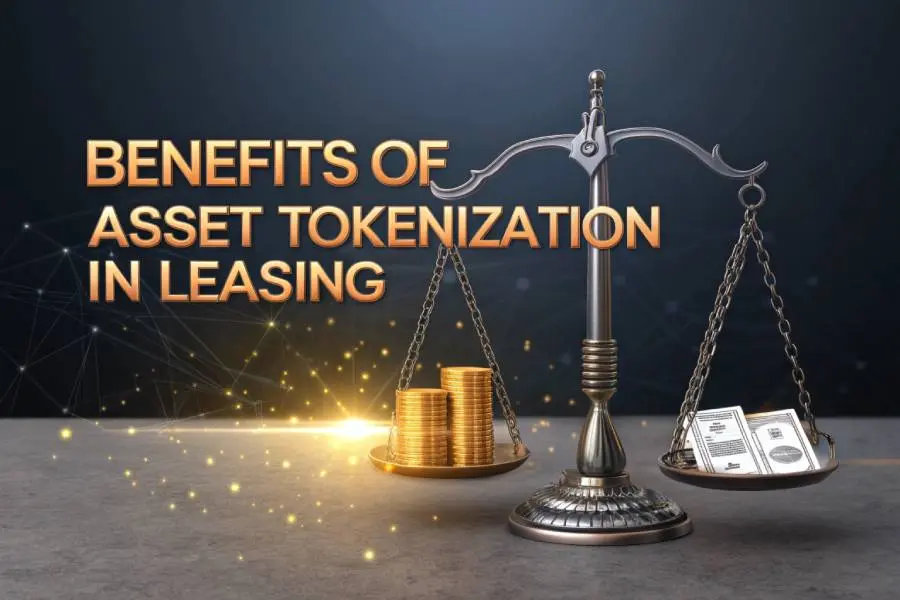
Asset Tokenization and Leasing offers numerous advantages that transform traditional financial models. Here are the key benefits:
1. Increased Liquidity
Tokenized assets can be easily traded on blockchain marketplaces, allowing investors to buy and sell fractional ownership shares with ease. This increased liquidity attracts a broader range of investors, enhancing market participation and asset utilization.
Liquidity is a game-changer, enabling investors to access and exit positions effortlessly, thereby making tokenized leasing a more attractive investment option.
2. Fractional Ownership
By dividing assets into smaller tokens, fractional ownership lowers the capital barrier, making high-value assets accessible to a wider audience. This democratization of investment allows individuals to diversify their portfolios without committing substantial funds to a single asset.
Fractional ownership empowers small investors to partake in lucrative investment opportunities that were previously out of reach.
3. Enhanced Transparency
Blockchain’s immutable ledger ensures that all transactions and ownership records are transparent and easily auditable. Real-time tracking of asset ownership and lease agreements fosters trust among stakeholders and reduces the risk of fraud.
Transparency builds confidence, ensuring that all parties have access to accurate and verifiable information.
4. Reduced Transaction Costs
By eliminating intermediaries and automating processes through smart contracts, tokenized leasing significantly reduces transaction and administrative costs. This cost efficiency benefits both asset owners and lessees, making leasing more affordable and profitable.
Lower costs translate to higher returns for investors and more competitive leasing terms for lessees.
5. Expanded Market Reach
Blockchain technology enables global access to tokenized assets, attracting investors and lessees from around the world. This expanded market reach increases the pool of potential participants, driving demand and enhancing asset utilization.
Global accessibility breaks down geographical barriers, creating a truly international leasing marketplace.
6. Security and Immutability
Blockchain’s robust security features protect tokenized assets from unauthorized access and tampering. The immutability of blockchain records ensures that ownership and lease agreements are secure and cannot be altered maliciously.
Security and immutability safeguard investments, providing peace of mind to all stakeholders.
Overall, asset tokenization in leasing creates a more dynamic, inclusive, and efficient financial ecosystem, benefiting investors, asset owners, and lessees alike.
Read More: Asset Tokenization Regulation: Navigating Compliance in 2024
Challenges and Risks in Tokenized Leasing
While Asset Tokenization and Leasing presents numerous benefits, it also faces several challenges and risks that need to be addressed for widespread adoption:
1. Legal and Regulatory Challenges
The regulatory landscape for tokenized assets is still evolving, with varying compliance requirements across different jurisdictions. Ensuring adherence to local laws, securities regulations, and tax implications can be complex and may hinder the growth of tokenized leasing.
Regulatory uncertainty poses a significant barrier, necessitating clear and consistent frameworks to support tokenized leasing.
2. Technological Limitations
Interoperability between different blockchain platforms and the scalability of blockchain networks are critical challenges. Additionally, ensuring data privacy and integrating legacy systems with blockchain technology require substantial technical advancements.
Technological hurdles must be overcome to ensure seamless and scalable tokenized leasing solutions.
3. Security Concerns
Despite blockchain’s inherent security features, tokenized leasing systems are not immune to cyber threats. Smart contract vulnerabilities, hacking attempts, and fraud can compromise the integrity of tokenized assets and leasing agreements.
Robust security measures and continuous monitoring are essential to protect against potential cyber threats.
4. Market Volatility
Cryptocurrency and token markets are known for their volatility, which can impact the value of tokenized assets and complicate leasing agreements. Fluctuating token prices may affect lease payments and the overall stability of tokenized leasing arrangements.
Market volatility introduces financial risks that need to be managed through stable and resilient tokenization strategies.
5. Investor Awareness and Adoption
Many potential investors and stakeholders may lack understanding of tokenized leasing models, leading to cautious interest and slow adoption. Educating the market and demonstrating the tangible benefits of asset tokenization are crucial for widespread acceptance.
Raising awareness and fostering education are key to driving adoption and unlocking the full potential of tokenized leasing.
6. Operational Risks
Managing and maintaining tokenized leasing platforms involves operational risks, including system downtime, technical glitches, and human errors. Ensuring reliable and efficient platform operations is vital for the smooth functioning of tokenized leasing.
Operational excellence is necessary to provide a seamless and trustworthy leasing experience for all parties involved.
Addressing these challenges requires collaborative efforts from industry stakeholders, technological advancements, and supportive regulatory frameworks to pave the way for the successful implementation of tokenized leasing.
Read More: Tokenization and Asset Financing: Transforming Finance
Applications of Asset Tokenization in Leasing
Asset Tokenization and Leasing is versatile, finding applications across various industries. Here are some prominent sectors leveraging tokenized leasing:
1. Real Estate
Tokenizing commercial and residential properties enables fractional ownership and leasing, making real estate investments more accessible. Investors can lease portions of properties, benefiting from rental income without owning entire buildings.
Tokenized real estate democratizes property investment, allowing more people to participate in the lucrative real estate market.
2. Automobile Leasing
Automobile leasing through tokenization allows individuals and businesses to lease cars without traditional ownership constraints. Fractional tokens represent shares in vehicle fleets, providing flexible leasing options and reducing costs.
Tokenized car leasing offers a modern alternative to traditional vehicle ownership, enhancing flexibility and affordability.
3. Industrial Equipment and Machinery
Businesses can lease industrial equipment and heavy machinery through tokenized assets, accessing high-value tools without significant capital investments. This is particularly beneficial for startups and small enterprises that require specialized equipment on a temporary basis.
Tokenized leasing of industrial equipment streamlines access to essential tools, fostering business growth and operational efficiency.
4. Aviation and Marine
Fractional leasing of aircraft and yachts through tokenization enables individuals and businesses to utilize high-value transportation assets without full ownership. This model provides cost-effective access to luxury and commercial vehicles, enhancing mobility and operational capabilities.
Tokenized aviation and marine leasing make luxury and commercial transportation more accessible and cost-efficient.
5. Luxury Goods and Artwork
High-value assets like fine art, jewelry, and collectibles can be leased through tokenized ownership. This allows enthusiasts and investors to enjoy and benefit from luxury items without the need for substantial upfront investments.
Tokenized leasing of luxury goods and artwork opens up new avenues for enjoying and investing in valuable collectibles.
6. Technology and Digital Assets
Digital assets, including software licenses and digital media, can be tokenized and leased, providing flexible access to technology and digital resources. This model supports the dynamic needs of businesses and individuals in the digital age.
Tokenized leasing of technology and digital assets facilitates flexible and efficient access to essential digital resources.
7. Renewable Energy Assets
Renewable energy equipment, such as solar panels and wind turbines, can be tokenized and leased, promoting sustainable energy practices. Investors can lease shares of renewable assets, supporting green initiatives while earning returns.
Tokenized leasing of renewable energy assets drives sustainability and provides investors with environmentally responsible investment opportunities.
The diverse applications of asset tokenization in leasing highlight its transformative potential across various industries, enhancing accessibility, efficiency, and financial inclusion.
Future of Tokenized Leasing: Trends and Predictions
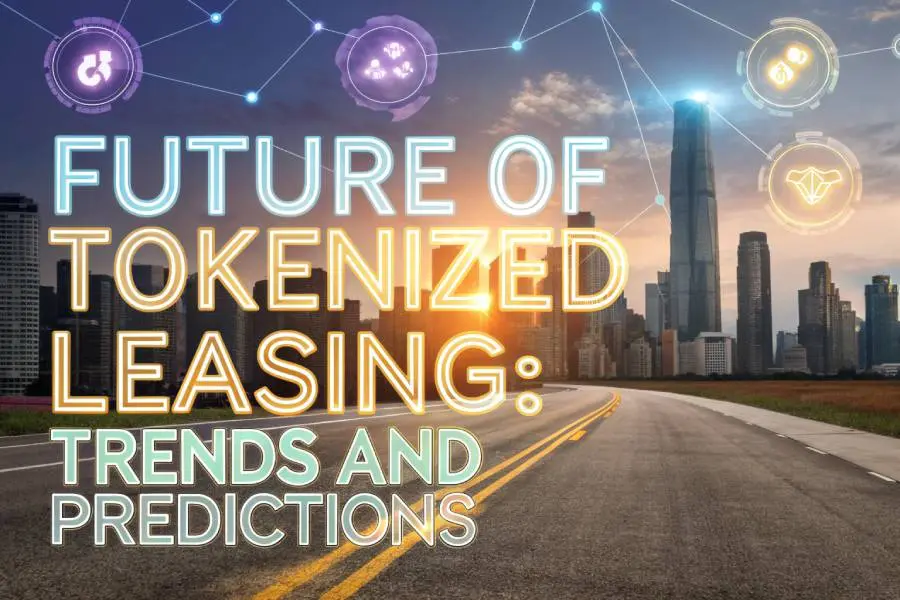
The future of Asset Tokenization and Leasing is poised for significant growth and innovation. Here are key trends and predictions shaping the landscape:
1. Wider Adoption Across Industries
As awareness and understanding of tokenized leasing grow, more industries are expected to adopt this model. Sectors like healthcare, education, and entertainment may explore tokenized leasing for assets such as medical equipment, educational tools, and entertainment venues.
Broader adoption across diverse industries will drive the expansion and integration of tokenized leasing solutions.
2. Advancements in Blockchain Technology
Continuous advancements in blockchain technology will enhance the scalability, security, and interoperability of tokenized leasing platforms. Innovations such as Layer 2 solutions and cross-chain compatibility will address current technological limitations, making tokenized leasing more efficient and robust.
Technological progress will overcome existing challenges, paving the way for more seamless and reliable tokenized leasing systems.
3. Evolution of Regulatory Frameworks
Governments and regulatory bodies are expected to develop comprehensive frameworks for tokenized assets and leasing. Clear regulations will provide legal certainty, protect investors, and foster trust, encouraging broader participation in tokenized leasing markets.
Evolving regulatory landscapes will support the legitimacy and sustainability of tokenized leasing, attracting more participants and investments.
4. Integration with Traditional Financial Institutions
Traditional financial institutions, such as banks and investment firms, are likely to integrate tokenized leasing into their service offerings. Collaboration between blockchain startups and established financial players will drive innovation and expand the reach of tokenized leasing solutions.
Integration with traditional finance will enhance credibility and accessibility, bridging the gap between conventional and blockchain-based financial systems.
5. Emergence of Decentralized Leasing Platforms
Decentralized leasing platforms will gain prominence, offering peer-to-peer leasing options without intermediaries. These platforms will leverage decentralized finance (DeFi) principles, providing more control and autonomy to users in managing their leases and investments.
Decentralized platforms will empower users, fostering a more democratic and efficient leasing ecosystem.
6. Enhanced User Experience and Accessibility
User-friendly interfaces and seamless onboarding processes will make tokenized leasing more accessible to non-technical users. Enhanced user experiences will attract a wider audience, including individuals and businesses new to blockchain and tokenization.
Improved accessibility will drive mass adoption, making tokenized leasing a mainstream financial tool.
7. Sustainable and Impact-Driven Leasing Models
Tokenized leasing will increasingly focus on sustainability and social impact, enabling investments in eco-friendly assets and socially responsible projects. This trend aligns with the growing emphasis on environmental, social, and governance (ESG) criteria in investment decisions.
Impact-driven leasing models will attract conscious investors, promoting sustainability and social responsibility in asset management.
8. Personalized and Customizable Leasing Solutions
Advancements in data analytics and artificial intelligence will enable personalized leasing solutions tailored to individual needs and preferences. Customizable lease terms, payment structures, and asset selections will enhance user satisfaction and engagement.
Personalization will cater to diverse user needs, making tokenized leasing more adaptable and appealing.
The future of tokenized leasing is bright, with immense potential to revolutionize asset management and investment. As technology evolves and adoption increases, tokenized leasing will become a cornerstone of the global financial landscape.
Insider Leasing Hacks
To maximize the benefits of Asset Tokenization and Leasing, consider these expert strategies and insights:
1. Start Small with High-Demand Assets
Begin by tokenizing high-demand assets with proven market appeal. This approach allows you to gauge investor interest and market dynamics before scaling up your tokenized leasing operations.
- Example: Start with real estate properties in prime locations or high-end vehicles with strong resale value.
2. Leverage Blockchain-Based Marketplaces
Utilize established blockchain marketplaces to list and trade your tokenized assets. These platforms offer built-in liquidity and exposure to a global pool of investors, enhancing the visibility and attractiveness of your tokenized leasing offerings.
- Tip: Research and choose marketplaces with robust security features and active user bases.
3. Regularly Audit Smart Contracts
Ensure the security and functionality of your smart contracts through regular audits. Engaging third-party security firms to review and test your smart contracts can prevent vulnerabilities and enhance trust among stakeholders.
- Action: Schedule periodic audits and implement updates based on audit findings to maintain contract integrity.
4. Educate Your Stakeholders
Provide comprehensive education and resources to your investors, lessees, and partners about the benefits and mechanics of tokenized leasing. Enhanced understanding fosters confidence and encourages broader participation.
- Strategy: Host webinars, create detailed guides, and offer one-on-one consultations to demystify tokenized leasing.
5. Implement Dynamic Pricing Models
Adopt dynamic pricing strategies that adjust lease terms and token prices based on market demand and asset performance. This flexibility allows you to optimize returns and respond swiftly to market changes.
- Example: Implement tiered pricing for different levels of asset usage or offer discounts for long-term leases.
6. Diversify Your Tokenized Asset Portfolio
Diversify the range of assets you tokenize to spread risk and attract a wider array of investors. A varied portfolio enhances stability and appeal, catering to different investment preferences and risk appetites.
- Tip: Explore tokenizing assets across multiple sectors, such as real estate, technology, and luxury goods, to diversify your offerings.
7. Foster Community Engagement
Build and nurture a community around your tokenized leasing platform. Engaged communities provide valuable feedback, promote your offerings, and contribute to the platform’s growth and success.
- Action: Create online forums, social media groups, and regular updates to keep your community informed and involved.
8. Utilize Data Analytics for Insights
Leverage data analytics to gain insights into investor behavior, market trends, and asset performance. Data-driven decisions enhance the effectiveness of your tokenized leasing strategies and optimize outcomes.
- Strategy: Implement analytics tools to monitor token transactions, lease agreements, and market conditions, using the data to inform strategic adjustments.
Applying these insider leasing hacks can help you navigate the tokenized leasing landscape effectively, maximizing benefits and driving success.
Tokenova’s Tokenization Solutions for Asset Leasing
Tokenova stands at the forefront of the Asset Tokenization and Leasing revolution, offering comprehensive solutions that cater to diverse asset management and leasing needs. With a focus on innovation, security, and regulatory compliance, Tokenova provides end-to-end tokenization services that empower businesses and investors alike.
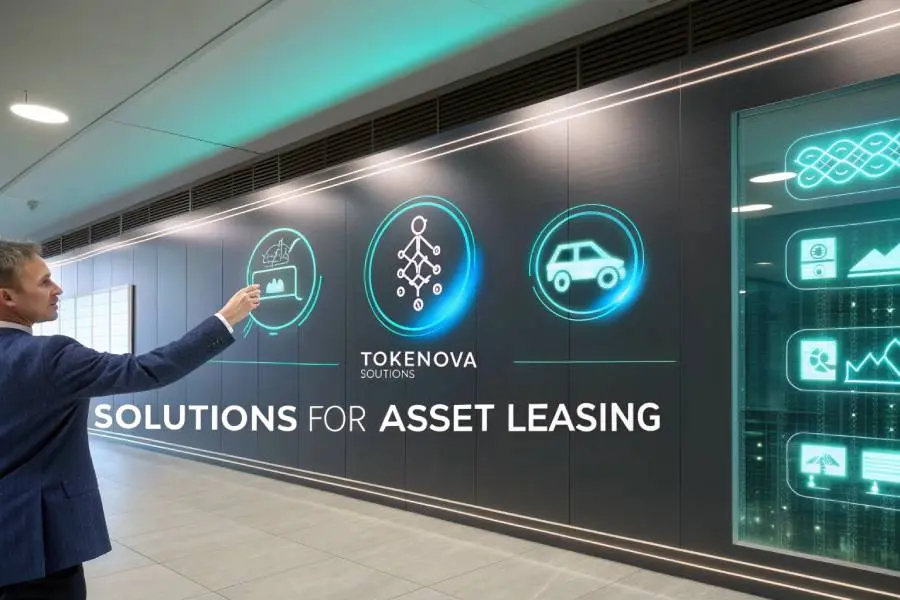
Tokenova Services Overview
Tokenova is a leading provider of asset tokenization services, specializing in transforming physical and digital assets into secure, tradable tokens on the blockchain. Leveraging extensive expertise in blockchain technology and financial regulations, Tokenova delivers tailored solutions that meet the unique requirements of each client.
Specialization in End-to-End Tokenization Services
Tokenova offers a complete suite of tokenization services, ensuring a seamless transition from traditional asset management to blockchain-based leasing solutions. Their services encompass advisory, design, development, and deployment, providing a holistic approach to asset tokenization and leasing.
Services Offered by Tokenova
- Advisory on Regulatory Compliance and Asset Selection:
- Expert guidance on navigating complex regulatory landscapes.
- Assistance in selecting suitable assets for tokenization and leasing.
- Smart Contract Development for Leasing Automation:
- Custom-designed smart contracts that automate lease terms, payments, and compliance.
- Ensuring security and efficiency in lease execution through robust contract design.
- Research, Design, and Deployment of Custom Tokenized Solutions:
- In-depth research and analysis to design tokenization strategies tailored to specific needs.
- End-to-end deployment of tokenized leasing platforms, ensuring smooth integration and operation.
- Ongoing Support and Maintenance:
- Continuous monitoring and support to ensure the reliability and security of tokenized leasing systems.
- Regular updates and enhancements to keep pace with technological advancements and regulatory changes.
Why Choose Tokenova for Tokenized Leasing?
- Expertise in Blockchain: Tokenova’s team comprises seasoned blockchain developers and financial experts, ensuring the highest standards of tokenization and leasing solutions.
- Regulatory Insights: In-depth understanding of global regulatory frameworks, providing clients with compliant and secure tokenization services.
- Tailored Solutions: Customized tokenization strategies that align with clients’ specific asset management and leasing objectives.
- Proven Track Record: Successful implementation of numerous tokenized leasing projects across various industries, demonstrating reliability and excellence.
Choosing Tokenova means partnering with a leader in asset tokenization, ensuring that your leasing solutions are secure, compliant, and optimized for success.
Ready to transform your assets into revenue-generating opportunities through tokenization? Contact Tokenova today to explore customized leasing solutions that harness the power of blockchain technology.
Conclusion
Asset Tokenization and Leasing mark a transformative shift in how assets are managed, owned, and utilized. By leveraging blockchain technology, this innovative model offers unparalleled benefits such as increased liquidity, fractional ownership, enhanced transparency, and reduced transaction costs. Tokenized leasing democratizes access to high-value assets, enabling a broader range of investors and lessees to participate in lucrative markets without significant capital barriers.
While the journey towards widespread adoption presents challenges, including regulatory uncertainties and technological hurdles, the potential rewards are immense. As blockchain technology continues to evolve and regulatory frameworks become clearer, tokenized leasing is poised to become a cornerstone of the future financial ecosystem. Businesses and investors that embrace this model can unlock new revenue streams, optimize asset utilization, and gain a competitive edge in an increasingly digital and interconnected world.
In essence, asset tokenization and leasing not only revolutionize financial transactions but also pave the way for a more inclusive, efficient, and transparent economy.
Key Takeaways
- Asset tokenization converts ownership into digital tokens, enabling fractional ownership and broader investment access.
- Tokenized leasing leverages blockchain’s transparency and automation to enhance flexibility, reduce costs, and increase liquidity.
- Applications span diverse industries, including real estate, automotive, industrial equipment, aviation, luxury goods, technology, and renewable energy.
- Challenges such as regulatory uncertainty, technological limitations, and security risks must be addressed for successful adoption.
- Future trends indicate wider adoption, technological advancements, regulatory evolution, and integration with traditional financial institutions.
- Tokenova offers comprehensive tokenization solutions, specializing in regulatory compliance, smart contract development, and customized leasing platforms.
- Insider strategies like starting with high-demand assets, leveraging marketplaces, and fostering community engagement can maximize tokenized leasing benefits.
Asset tokenization and leasing represent the future of asset management, offering innovative solutions that cater to the needs of modern investors and businesses.
What are the environmental impacts of asset tokenization and leasing?
Asset tokenization and leasing can have both positive and negative environmental impacts. On the positive side, tokenizing assets like renewable energy equipment can promote sustainable investments and support green initiatives. However, the energy consumption of blockchain networks, especially those using proof-of-work consensus mechanisms, can contribute to carbon emissions. To mitigate this, many tokenization platforms are adopting more energy-efficient blockchain technologies, such as proof-of-stake, and investing in carbon offset programs.
How can tokenized leasing enhance corporate asset management?
Tokenized leasing enhances corporate asset management by providing a transparent and efficient way to manage and lease assets. Companies can easily track asset utilization, lease agreements, and payments through blockchain’s immutable ledger. This reduces administrative overhead, minimizes errors, and ensures compliance with lease terms. Additionally, fractional ownership allows companies to optimize asset usage and generate additional revenue streams by leasing out unused portions of their assets.
What role does artificial intelligence play in tokenized leasing?
Artificial intelligence (AI) can significantly enhance tokenized leasing by automating decision-making processes, predicting market trends, and optimizing lease terms. AI algorithms can analyze vast amounts of data to determine optimal pricing strategies, forecast demand, and identify potential risks. Moreover, AI-powered chatbots and virtual assistants can improve customer service by providing instant support and personalized recommendations to investors and lessees, thereby enhancing the overall user experience.



